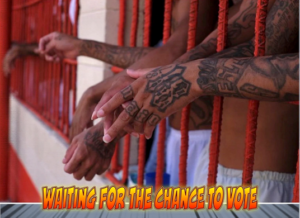 By Dennis Linthicum, Oregon State Senator
By Dennis Linthicum, Oregon State Senator
February 8, 2023
Oregon’s SB 579 — This bill would allow persons convicted of felony crimes to vote in elections during their period of incarceration; allows felons to register to vote and to update voter registration.
The Senate Judiciary Committee held its first public meeting for SB 579 last Thursday and the bill was scheduled for a Committee vote on February 2, 2023, but that vote has been cancelled for the time being. Because this Bill may come back onto the schedule, it is still worth discussing.
During the public hearing, the vast majority of favorable comments came from government or non-governmental organizations (NGOs) vested with interests in both the problem and the solution. The criminal justice space is filled with this odd assortment of “concerned” politicians, bureaucrats, and non-profits that all have a vested economic or political interest.
It is somewhat disconcerting to see agencies, which specialize in some distinct aspect of the criminal justice service industry, stretch their respective duties to include a new-found moral charter about “saving our Democracy.”
Clearly, the numbers are lopsided when it comes to weighing exactly whose rights, privileges and dignity should be protected. There are at least 4 million hardworking Oregonians who would be negatively impacted while there are less than 20,000 convicted felons currently incarcerated. Various civil rights, like the right to counsel and equal protection under the law, are not the same as giving decision-making authority to any of the most odious of all incarcerated criminals.
The elites pretend there are no trade-offs, but there are, and they are innumerable. Our right, to life, liberty and our own just pursuits are all fenced by societal limitations.
The social media fanfare and associated hype for restoring the right to vote for felons, while they are still in prison, is one-sided and duplicitous. This is due to the failure of recognizing that the rights of this minority cannot be protected through insolent, and disrespectful notions which degrade the rights of others. Namely, both sides of the equation need to be considered. Rightful and specific restraints for criminal convicts provides motivation for creating self-worth and community respect through vocational training and educational programs. Removing the restraints that accompany incarceration would impede or cancel the incentives for turning a new leaf and striving through the rehabilitation process while delivering recompense to society.
 Proponents for restoration of voting rights conveniently ignore that felons lose other civil rights as well, such as the right to sit on a jury, own a gun, obtain various professional licenses, work as a public-school teacher or a law enforcement officer. While these other civil rights are actually lost for a lifetime, the current restrictions on voting only remain in effect while the felon remains in prison.
Proponents for restoration of voting rights conveniently ignore that felons lose other civil rights as well, such as the right to sit on a jury, own a gun, obtain various professional licenses, work as a public-school teacher or a law enforcement officer. While these other civil rights are actually lost for a lifetime, the current restrictions on voting only remain in effect while the felon remains in prison.
The rehabilitation process, and the restoration of community life, does not happen successfully without hard-work and effort by the convicted inmate. It is irresponsible to restore the right to vote without also addressing other obligations and responsibilities associated with an honorable and fruitful life within their family and community.
Hidden just below the surface of this “right to vote” issue lies a bigger issue – the integrity of Oregon’s election system. In one sense, 50% of all Oregonians understand that Vote-By-Mail is the gold-standard for election engineering. This causes many to wonder whether another 15,000 felonious ballots would matter. After all, the progressive freeway to unparalleled voter fraud has been ramped up, with HB 3291, HB 4133, HB 2861 having been signed into law since 2022.
In the truest sense, an individual’s right to vote depends entirely on their own independent, free-will agency and their ability to act within a system of open and fair electoral processes. This is a cornerstone of our republic and is essential to ensuring public trust in the common good.
This bill would violate those standards by exposing one of our most vulnerable populations to political coercion. Obviously, the prison population has fewer opportunities to act independently while serving time. The potential for coercion can arise from many fronts, including foreign cartels, gang members, corrupt prison employees, or unethical elected officials. All of these disreputable actors would appreciate being able to control, limit or slant incoming media while using every opportunity to buy, entice or coerce wanted votes from this captured population.
Or maybe the reformists are saying they no longer believe in victims’ rights or justice for those injured during outlandish and gruesome crimes? Maybe they believe that restoring a felon’s right to vote will provide vindication, or recompense to society? Will this “restoration of human dignity” for the criminal also provide the same level of restoration and dignity to the rape victim, or the spouse of a murder victim?
Will the rights of this fringe minority over-ride our societal and historic sanctions? If this rightful sanction cannot be protected where will the majority go to find justice? Is it possible that the leftist media can demean and diminish proper and appropriate restraints without impacting our very future?
In today’s cultural confusion any one-off individual, the smallest possible minority, in any bizarre or nontraditional circumstance, can always claim the right to have their minority view upheld, elevated or even celebrated. So, where does this leave society?
The discussion about criminal adults in custody has been pushed by progressives in the Democrat Party. They are now ready to allow those that have made disastrous choices an equal voice in determining the rules and norms that get incorporated into the very heart of the laws and rules that they have chosen to break, ignore, or even despise.
The deeper question is, should our criminal justice system focus on victims and their rights, or the rights of those that have been convicted of felonious assault, rape, murder or other violent acts? Or, more succinctly, should we focus on justice, or misplaced compassion?
Join with me to Defend Life, Liberty and Property! Contribute Today!
If we don’t stand for rural Oregon Values and common-sense… No one will!
© 2023 Dennis Linthicum – All Rights Reserved
E-Mail Dennis Linthicum: d4linthicum@gmail.com
E-Mail Dennis Linthicum: sen.DennisLinthicum@oregonlegislature.gov





